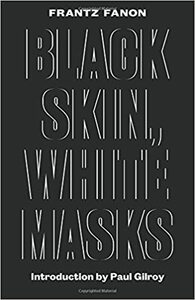Take a photo of a barcode or cover
As a reader in 2018, it's hard to digest the heavily psychanalytic method that Fanon applies. The book really could've done with the same conclusions, but without the psychoanalysis as a method of reasoning leading to them. I also think the psychoanalysis stuff leads Fanon to problematic, if not completely erroneous conclusions about some female experiences ("phase clitoridienne" ? bon sang...).
Nonetheless, Fanon is incredibly ahead for his time, maybe even for our time, and his incredible sensitivity is manifest in spot-on observations on the dynamics that regulate the relationship of the black man to the white man. One of my favorite bits in the book is Fanon's reflections on language: I can't claim I experience a tenth of what Fanon does, not being black and no longer being colonized, but I can sometimes relate my experience with French (and sometimes even English) to what Fanon describes. The beautifully written conclusion is another favorite, both radical and pragmatic: a description of the immensely oppressive lived experience of racism, a reminder of the constructed nature of race, and lucid differentiation between class-inflected experiences of racism.
I'm also surprised by how much of Fanon's influence is felt in Anglo-Saxon discourse on racial dynamics, but how little it is felt in French/Francophone discourse—despite Fanon's writing about France, in French, and in dialogue with many of France's foremost thinkers (Sartre!!). Really shows how the amnesia over Algeria persists, and how much work remains for France in grappling with its colonial history...
Nonetheless, Fanon is incredibly ahead for his time, maybe even for our time, and his incredible sensitivity is manifest in spot-on observations on the dynamics that regulate the relationship of the black man to the white man. One of my favorite bits in the book is Fanon's reflections on language: I can't claim I experience a tenth of what Fanon does, not being black and no longer being colonized, but I can sometimes relate my experience with French (and sometimes even English) to what Fanon describes. The beautifully written conclusion is another favorite, both radical and pragmatic: a description of the immensely oppressive lived experience of racism, a reminder of the constructed nature of race, and lucid differentiation between class-inflected experiences of racism.
I'm also surprised by how much of Fanon's influence is felt in Anglo-Saxon discourse on racial dynamics, but how little it is felt in French/Francophone discourse—despite Fanon's writing about France, in French, and in dialogue with many of France's foremost thinkers (Sartre!!). Really shows how the amnesia over Algeria persists, and how much work remains for France in grappling with its colonial history...
challenging
informative
inspiring
reflective
slow-paced
A fantastic exploration of the psychological impacts of colonial relations on the colonised people. Has me thinking about the way power relations are embodied in other contexts- not just white/black but other too.
this book is a wound. it is a seminal text in (to borrow from berger) ways of seeing--and, along with audre lorde's sister outsider, it taught me about the uses of anger.
Not sure why I originally gave this four stars. Was reading parts of it the other day and it deserves all of the stars, obviously.
slow-paced
I find myself one day in the world, and I acknowledge one right for myself: the right to demand human behaviour from the other...
I am not a prisoner of History. I must not look for the meaning of my destiny in that direction.
I must constantly remind myself that the real leap consists of introducing invention into life.
In the world I am heading for, I am endlessly creating myself.
A book about the alienation of Black people, with a focus on Black men, from a psychoanalytical perspective. While there is a lot of dated, pseudo scientific analysis that can be tiresome to get through, Fanon also explicitly acknowledges the material reality underpinning this sense of learnt superiority and inferiority in racial identity - an economic, social and psychological imposition.
Drawing heavily on similarities to anti-Semitism, the text ultimately shows the issues with identity resulting from colonial and anti-Black racism, which first need to be understood in order to be liberated from the resulting (social, not individual) neuroses. Fanon argues that white civilisation’s colonial and imperial impact alter everyone’s sense of identity on a fundamental level, reflected in their vernacular, sexual preferences and deepest fears and fantasies.
Fanon’s way of conclusion is a call to not dwell on the past but to act, in solidarity, towards a future in which everyone’s full humanity is recognised - something that requires active recognition and rejection of everything that they have internalised.
Worthwhile for its social and philosophical components, its deeply personal and introspective nature, but challenging in its homophobia, misogyny and reliance on psychoanalysis.
challenging
reflective
slow-paced
challenging
informative
reflective
I think this book mainly suffers from being outdated. Lots of homophobia and misogyny, resting on a base of psychoanalytic thought that boils everything down to a penis, but there are still some really good things in here. Must remember historical context when reading, for sure.





